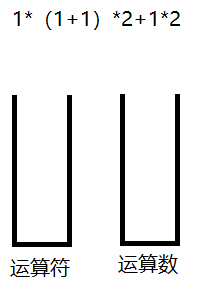功能:
实现计算器,可以运算带括号的表达式。
如1+(1+1)*2+1
首先,我们需要了解中缀表达式和后缀表达式。
中缀表达式(符号在中间):
如1+(1+1)*2+1
后缀表达式(符号在后面):
如上会得到1 1 1 + 2 * + 1 +
步骤:
①从左往右,若遇到数字先放一边,遇到符号就进栈。
②若栈顶是“(”,接下来符号肯定进栈;若接下来遇到“)”,“)”不进栈,将符号从栈里取出,直到遇到“)”,将“)”删除。若接下来符号优先级比栈顶高则进栈,若低则取出栈顶,新符号进栈。
③将栈内最后符号出栈后,这个表达式就是后缀表达式。
④接下来从左往右遇到数字就进栈,遇到符号则将栈顶和栈顶下一个元素进行该符号运算,后出来的运算前一个,得值再进栈。
⑤最后栈内元素就是数值大小。
图例:


为了方便快速计算,我们使用两个栈。

运算数:
直接进栈
运算符:
进栈
空栈 || 优先级高 || 栈顶是“(”并且表达式不是“)”
出栈不计算
栈顶是“(”同时是表达式是“)”
出栈计算
表达式优先级不高于栈顶 || 表达式是“)”同时栈顶不是“(” || 表达式为空但是栈不为空
计算
1 * (1 + 1 ) * 2+1 * 2

main.c
/*
程序功能:实现计算器,可以运算带括号的表达式。
编程环境:Dev-C++
程序模块:main.c/linkstack.c/linkstack.h
*/
#include "linkstack.h"
int Priority(char ch)
{
switch(ch)
{
case '(':
return 3;
case '*':
return 2;
case '/':
return 2;
case '+':
return 1;
case '-':
return 1;
default:
return 0;
}
}
int main()
{
Stack s_num,s_opt; //定义数字栈、符号栈
if (InitStack(&s_num) == FAILURE || InitStack(&s_opt) == FAILURE)
{
printf("初始化失败!\n");
return -1;
}
char opt[128] = {0};
int i = 0, tmp = 0, num1, num2;
printf("请输入表达式:\n");
scanf("%s", opt);
while (opt[i] != '\0' || EmptyStack(&s_opt) != SUCCESS) //表达式不为空或栈不为空就继续
{
if (opt[i] >= '0' && opt[i] <= '9') //若下位是数字,求出asc码
{
tmp = opt[i] - '0';
i++;
if (opt[i] < '0' || opt[i] > '9') //若下位不是数字,将tmp入栈;若下位是数字继续循环
{
push(&s_num, tmp);
tmp = 0;
}
}
else //操作符
{
if (EmptyStack(&s_opt) == SUCCESS || Priority(opt[i]) > Priority(GetTop(&s_opt)) ||
(GetTop(&s_opt) == '(') && (opt[i] != ')'))
{
push(&s_opt, opt[i]);
i++;
continue;
}
if (GetTop(&s_opt) == '(' && opt[i] == ')')
{
pop(&s_opt);
i++;
continue;
}
//此处可直接用else判断
if (Priority(opt[i]) <= Priority(GetTop(&s_opt)) || ((opt[i] == ')') && GetTop(&s_opt) != ')') ||
opt[i] == '\0' && EmptyStack(&s_opt) != SUCCESS)
{
switch(pop(&s_opt))
{
case '+':
num1 = pop(&s_num);
num2 = pop(&s_num);
push(&s_num, num1 + num2);
break;
case '-':
num1 = pop(&s_num);
num2 = pop(&s_num);
push(&s_num, num2 - num1);
break;
case '*':
num1 = pop(&s_num);
num2 = pop(&s_num);
push(&s_num, num1 * num2);
break;
case '/':
num1 = pop(&s_num);
num2 = pop(&s_num);
push(&s_num, num2 / num1);
break;
}
}
}
}
printf("%d\n", GetTop(&s_num));
return 0;
}
linkstack.c
#include "linkstack.h"
int InitStack(Stack *s)
{
if (NULL == s)
{
return FAILURE;
}
s->top = NULL;
s->length = 0; //表示空栈
return SUCCESS;
}
int push(Stack *s, int num)
{
if (NULL == s)
{
return FAILURE;
}
Node *n = (Node *)malloc(sizeof(Node) * 1);
if (NULL == n)
{
return FAILURE;
}
n->data = num;
n->next = s->top;
s->top = n; //更新栈顶指针
s->length++;
return SUCCESS;
}
int GetTop(Stack *s)
{
if (NULL == s)
{
return FAILURE;
}
if (s->top == NULL)
{
return FAILURE;
}
return s->top->data;
}
int pop(Stack *s)
{
if (NULL == s)
{
return FAILURE;
}
if (s->top == NULL) //空栈不能出栈
{
return FAILURE;
}
Node *n = s->top;
int data = n->data;
s->top = n->next;
free(n);
s->length--;
return data;
}
int EmptyStack(Stack *s)
{
if (NULL == s)
{
return FAILURE;
}
return (s->top == NULL) ? SUCCESS : FAILURE;
}
linkstack.h
#ifndef LINKSTACK_H
#define LINKSTACK_H
#include <stdio.h>
#include <stdlib.h>
#define SUCCESS 1000
#define FAILURE 1001
struct Node //表示结点信息
{
int data;
struct Node *next;
};
typedef struct Node Node;
struct Stack //表示栈信息
{
Node *top;
int length;
};
typedef struct Stack Stack;
int InitStack(Stack *stack);
int push(Stack *s, int num);
int GetTop(Stack *s);
int pop(Stack *s);
int EmptyStack(Stack *s);
#endif
实现效果
